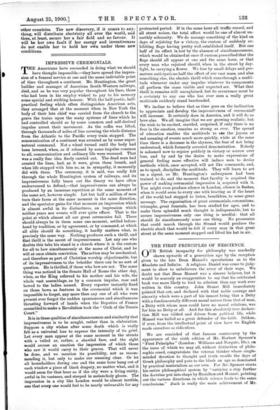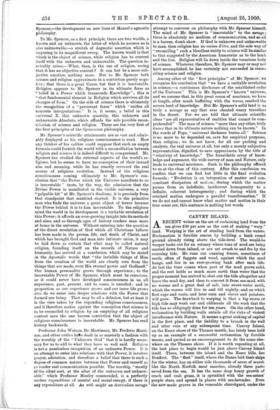THE FIRST PRINCIPLES OF NESCIENCE.
OUR British incapacity for philosophy was markedly shown upwards of a generation ago by the reception given to the late Dean Mansel's speculations as to the Absolute and Infinite. A religious Daniel was come to judg- ment to show to unbelievers the error of their ways. We doubt not that Dean Mansel was a sincere believer, but it would be scarcely an exaggeration to say that his celebrated book was more likely to lead to. atheism than any work ever written in this country. John Stuart Mill immediately pointed that out, and declared with that noble courage and sincerity which were a part of his inmost being that a Deity with a fundamentally different moral nature from that of man, a Deity with whom man could have no moral relations, was for him no Deity at all. And for this absolutely true declara- tion Mill was vilified and driven from political life, while Mansel was hailed as a great defender of the faith. Seldom, if ever, from the intellectual point of view have we English made ourselves so ridiculous.
We are reminded of that famous controversy by the appearance of the sixth edition of Mr. Herbert Spencer's " First Principles " (London : Williams and Norgate, 16s.), on the issue of which we may all, without distinction of philo- sophic creed, congratulate the veteran thinker whose single- minded devotion to thought and truth recalls the days of Greek philosophy and puts to the blush an age so dominated by practical materialism as our own. For Mr. Spencer starts his entire philosophical system by " carrying a step further the doctrine put into shape by Hamilton and Mansel; pointing out the various directions in which science leads to the same conclusions." such is really the main achievement of Mr.
Spencer,—the development on new lines of Manses agnostic philosophy.
To Mr. Spencer, as a first principle, there are two worlds, a known and an unknown, the latter of which be assures us is also unkaowable,—a stretch of dogmatic assertion which is imposing in its magnificent sweep. The known world is that which is the object of science, while religion has to content itself with the unknown and unknowable. The question in- evitably arises,—What, then, is the use of religion, seeing that it has no objective content P It can but be a mere sub- jective emotion, nothing more. But to Mr. Spencer both science and religion approximate in a conviction purely nega- tive ; that there is a great Cause, but that it is inscrutable. Religion appears to Mr. Spencer in its ultimate form as "belief in a Power which transcends Knowledge " ; this is "that fundamental element in Religion which survives all its changes of form." On the side of science there is ultimately the recognition of a " persistent force" which " unifies all concrete interpretations." It is, it seems, a belief in this universal X, this unknown quantity, this unknown and unknowable Absolute, which affords the sole possible recon- ciliation of science and religion. These are the very first of the first principles of the Spencerian philosophy.
Mr. Spencer's scientific attainments are as vast and admir- ably displayed as his religious consciousness is weak. How any thinker of his calibre could suppose that such an empty formula could furnish the world with a reconciliation between religion and science it is indeed difficult to comprehend. Mr. Spencer has studied the external aspects of the world's re- ligions, but he seems to have no conception of their inward aim and meaning, while he has exactly reversed the real course of religious evolution. Instead of the religious consciousness coming ultimately to Mr. Spencer's con- clusion that "the Power which the Universe manifests to us is inscrutable " (note, by the way, the admission that the Divine Power is manifested in the -visible universe, a very "palpable hit" at Mr. Spencer's dualism), it is precisely from that standpoint that mankind started. It is the primitive man who finds the universe a great object of terror because the Power behind it is to him inscrutable. To the religious mind the world in its development is a veritable revelation of this Power; it affords an ever-growing insight into its methods and aims, and so through ages of history renders man more at home in the universe. Without entering into the question of the direct revelation of God which all Christians believe has been made in the person, life, and death of Christ, and which has brought God and man into intimate union, it may be laid down as certain that what may be called natural religion, founding itself on the records of Nature and humanity, has arrived at a conclusion which may be stated in the Apostolic words that " the invisible things of Him from the creation of the world are clearly seen from the things that are made, even His eternal power and Godhead." Our human personality grows through experience ; to the inscrutable Power of Mr. Spencer, which must be conscious, or it could never have developed consciousness in us, all experience, past, present, and to come, is unrolled ; and in proportion as our experience grows and our inner life grows also do we enter into deeper relations with the Power that formed our being. That may be all a delusion, but at least it is the view taken by the expanding religious consciousness, and it therefore makes against the conception that science is to be reconciled to religion by an emptying of all religious content save the one barren conviction that the object of religious consciousness is inscrutable. Mr. Spencer has read history backwards.
Professor John Watson, Dr. Martineau, Mr. Frederic Harri- son, and other critics haite dealt in so masterly a fashion with the worship of the " Unknown God" that it is hardly neces- sary for us to add to what they have so well said. Religion is not a passionless recognition of an unknown Power. It is an attempt to enter into relations with that Power, it involves prayer, adoration, and therefore a belief that there is such a degree of common nature between that Power and oneself as to render real communication possible. The worship, "mostly of the silent sort, at the altar of the unknown and unknow- able," which Professor Huxley commended, is a perfectly useless expenditure of mental and moral energy, if there is any expenditure at all. As well might an Australian savage attempt to converse on philosophy with Mr. Spencer himself. The mind of Mr. Spencer is " inscrutable " to the savage ; there is absolutely no medium of communication, and so all is a barren, dumb show. If God is unknown and unknowable to man, then religion has no raison d'are, and the sole way of " reconciling " such a bloodless entity to science will be similar to that suggested by the American humourist as to the lamb and the lion. Religion will lie down inside the voracious body of science. Whatever, therefore, Mr. Spencer may or may not have accomplished, he has certainly not succeeded in recon- ciling science and religion.
Among other of the " first principles " of Mr. Spenoer, we recognise his conclusion that "we have a veritable revelatiOn in science,—a continuous disclosure of the established order of the Universe." This is Mr. Spencer's " known" universe, and we assume that, in this great ocean of nescience, we have at length, after much buffeting with the waves, reached:the secure land of knowledge. But Mr. Spencer's solid land is as truly a mirage as any that ever cheated weary travellers in the desert. For we are told that ultimate scientific ideas " are all representative of realities that cannot be com- prehended." The man of science, " more than any other, truly knows that in its ultimate nature nothing can be known." In the words of Pope, " universal darkness buries all." Science is no more to be depended on, save for empirical purposes, than religion ; we do not know, for all our probing and analysis, the real universe at all, but only a merely subjective representation, dignified, to save appearances, by the title of "relativity of knowledge." The formidable array of know- ledge and argument, the wide survey of man and Nature, only leads to universal nescience. Such is the philosophy offered to us at the close of this century. After this conclusion we confess that we can find but little in the final evolution formula : " Evolution is an integration of matter and con- comitant dissipation of motion; during which the matter passes from an indefinite, incoherent homogeneity to 'a definite, coherent heterogeneity ; and during which the retained motion undergoes a parallel transformation." If we do not and cannot know what matter and motion in their true sense are, this sentence is nothing but words.



































 Previous page
Previous page